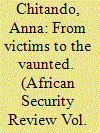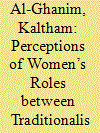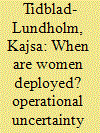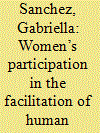|
|
|
Sort Order |
|
|
|
Items / Page
|
|
|
|
|
|
|
| Srl | Item |
| 1 |
ID:
170254


|
|
|
|
|
| Summary/Abstract |
Reflecting on young women involved in violence/peace, the dominant views present them as victims. This is understandable, as young women constitute the majority of those who are at the receiving end of violence. Further, young people are generally regarded as a threat. However, this paradigm glosses over the contribution of young women to peacebuilding in their communities. Despite the UN Security Council Resolution 1325 calling for women’s equal participation and full involvement in all efforts for the maintenance and promotion of peace and security, major challenges of its implementation in Africa remain. Therefore, this study sought to establish young women’s understanding of peacebuilding, activities they undertook to contribute to peacebuilding in Mashonaland East in Zimbabwe, and the challenges they encounter. The study prioritised the agency of young women in contributing towards peace in Mashonaland East, Zimbabwe. The research was based on the qualitative method as it sought to establish how women participate in peacebuilding. Findings of the study showed that young women are contributing to peacebuilding, although they face some challenges.
|
|
|
|
|
|
|
|
|
|
|
|
|
|
|
|
| 2 |
ID:
169445


|
|
|
|
|
| Summary/Abstract |
Women’s participation in public life in the Arabian Peninsula is affected by tradition and limits their opportunities for socio-economic development. This study focuses on the social structures that impose gender inequality. Through in-depth focus group discussions with groups of men and women in different age groups and including both working and non-working individuals, gender roles are examined and the view of the different groups of men and women in Qatar of the roles that women are supposed to play inside and outside the home. Although some changes are occurring due to modernization, including education and other government policies, they are proving relatively minor: obstacles include deep-rooted kinship structure and cultural elements that limit women’s participation in the public sphere.
|
|
|
|
|
|
|
|
|
|
|
|
|
|
|
|
| 3 |
ID:
174764


|
|
|
|
|
| Summary/Abstract |
This study explores how the duration of missions affects the participation of women in United Nations (UN) peace operations. I argue that women are less likely to be deployed in the early stages of missions because new missions are associated with high levels of operational uncertainty, which is ultimately a type of risk. Instead, women’s participation will increase over time as the uncertainty decreases and the operating environment becomes more predictable. In an extended analysis, I also explore if the level of gender equality in a troop contributing country affects the decision to deploy women to the early phases of missions. Applying a large-N approach, I study the proportion of women in military contributions to UN peace operations between 2009 and 2015. Using a set of multilevel mixed-effects generalized linear models, the main argument find empirical support. However, when the robustness of the findings is challenged, there is indication that there could be additional factors that affect operational uncertainty and the perceived risk associated with an operating environment. The result of the extended analysis indicate that more gender equal countries are more prone to deploy larger proportions of female military personnel, regardless of when the deployment takes place.
|
|
|
|
|
|
|
|
|
|
|
|
|
|
|
|
| 4 |
ID:
146090


|
|
|
|
|
| Summary/Abstract |
Despite the central role of human smuggling in irregular migration, empirical research on the practice and its facilitators has been scant. Drawing from ethnographic observations and data present in court cases, this essay explores the roles of women at providing human smuggling services in Phoenix, Arizona, which by the turn of the twenty-first century became one of the US main hubs for irregular migration. While frequently overlooked within the mainstream rhetoric of smuggling dominated by male-centred narratives of exploitation, victimisation and violence, women play fundamental roles in the facilitation of irregular migration. They recruit customers, negotiate fees and payment plans; withdraw smuggling payments from banks and wire transfer stores, care for migrants and drive or guide groups of border crossers through the desert. This essay argues, in line with recent anthropological scholarship on precarious forms of labour present under globalisation, that the facilitation of irregular migration constitutes for its participants a valid, legitimate form of labour. Smuggling actors are neither predators nor victimisers, but rather ordinary people experiencing the tensions abundant in the precarity of contemporary, neoliberal life.
|
|
|
|
|
|
|
|
|
|
|
|
|
|
|
|
|
|
|
|
|